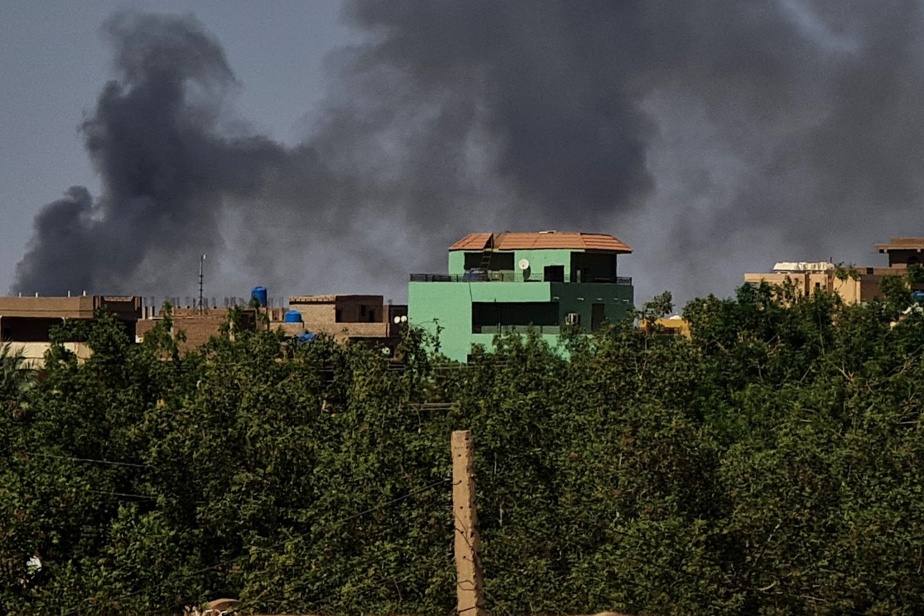(Khartoum) Fighting between the army and paramilitaries for power in Sudan is still raging on Friday and could push more than two million more people into hunger, warns the UN.
On the 21st day of the conflict, airstrikes and explosions continued to rock different parts of Khartoum, despite promises of a truce, witnesses told AFP.
Clashes between General Abdel Fattah al-Burhane’s army and General Mohamed Hamdane Daglo’s Rapid Support Forces (FSR) have left around 700 dead since April 15, according to the NGO ACLED, which lists the victims of conflicts.
Among them are an “incredibly” high number of children, according to the UN, in a country where 49% of the population is under the age of 18.
But beyond the direct victims, this new war is increasing hunger, a scourge that already affected one in three Sudanese. According to the UN, between 2 and 2.5 million additional people could suffer from acute malnutrition within six months if the conflict continues.
Faced with the “catastrophe” denounced for three weeks by humanitarian workers, the international community is struggling to act in organized ranks. The UN Human Rights Council will hold a special session on May 11, nearly a month after hostilities began.
Sunday, it is the ministers of the countries of the Arab League who must examine “the Sudanese file” on which they are deeply divided, after several discussions between leaders of the African Union (AU) and Igad, the regional organization of East Africa.
In Washington, President Joe Biden brandished the threat of sanctions on Thursday but limited himself to denouncing “individuals who threaten the peace”, without naming anyone.
The United States is jointly mediating with Saudi Arabia for a ceasefire that does not always seem to converge with other regional efforts to silence the guns.
US intelligence expects a “protracted” conflict because “both sides believe they can win militarily and have little reason to come to the negotiating table.”
The country of 45 million people only emerged in 2020 from two decades of American sanctions imposed on the military-Islamist dictatorship of General Omar al-Bashir, overthrown by the army under pressure from the streets in 2019 after thirty years of power.
In a putsch in 2021, Generals Burhane and Daglo ousted the civilians with whom they had shared power since the fall of Mr. Bashir. But they differed on the integration of the FSR into the army. Since then, nothing seems to be able to reconcile the two men who accuse each other of violating the successive truces announced but never respected.
The fighting has left more than 5,000 injured, displaced at least 335,000 people and pushed 115,000 others into exile, according to the UN, which is calling for 402 million euros to help the country, one of the poorest in the world. world.
The UN warns that 860,000 people, Sudanese but also many South Sudanese returning to their country, could cross the borders in the coming months.
“More than 56,000 people” have arrived in Egypt, according to the UN, “30,000 in Chad”, “more than 12,000” in Ethiopia and 10,000 in the Central African Republic.
Afdal Abdel Rahim is waiting to cross into Egypt. “When the war started, with shelling and airstrikes,” she told AFP, “we left our homes and fled to Wadi Halfa,” the last town before Egypt where thousands of Sudanese fleeing the war are crowding.
In Darfur, in the western border of Chad, civilians have been armed to participate in clashes mixing soldiers, paramilitaries and tribal or rebel fighters, according to the UN.
The NGO Norwegian Refugee Council (NRC), whose premises were looted, counts “at least 191 dead, dozens of homes burned and thousands displaced” in this region ravaged in the 2000s by a conflict that caused around 300,000 dead and 2.5 million displaced according to the UN.
Witnesses also reported Thursday fighting in El-Obeid, 300 km south of the capital.
In the coastal city of Port-Sudan, spared by the violence, the UN and more and more NGOs are trying to negotiate the delivery of these cargoes to Khartoum and Darfur where hospitals and humanitarian stocks have been looted and bombarded.
As diplomatic initiatives multiply in Africa and the Middle East, the military has pleaded for “African solutions to the continent’s problems”, while welcoming US-Saudi mediation.
She pledged to “appoint an envoy to negotiate a truce” with the rival camp, under the aegis of “the presidents of South Sudan, Kenya and Djibouti”, in a country yet to be determined.

